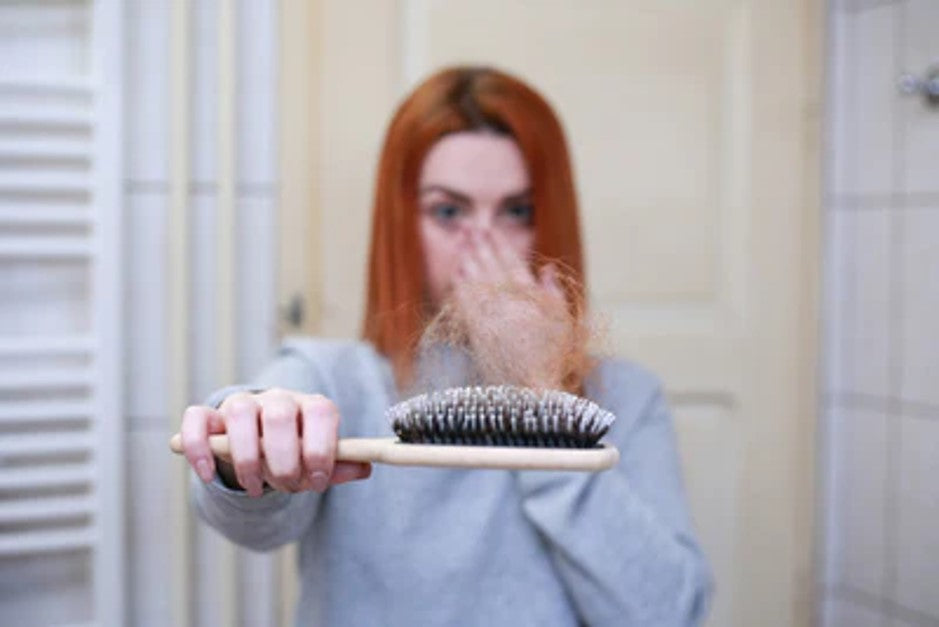Hypothyroidism hair loss is diffuse and involves the entire scalp rather than specific areas. The hair appears uniformly sparse. Fortunately, thyroid hair loss regrowth is possible, when using a successful treatment. The thyroid is a butterfly-shaped gland in your neck, just above your collarbone and is one of your endocrine glands, which makes hormones.
This article will discuss what thyroid hair loss is and how you can treat your hair loss effective. The following topics are explained.
- How do you know if hair loss is from thyroid?
- Why does thyroid issues cause hair loss?
- Which thyroid causes hair loss?
- Can thyroid hair loss be reversed?
- When does thyroid hair loss stop?
HOW DO YOU KNOW IF HAIR LOSS IS FROM THYROID?
Thyroid and hair loss don’t always be linked. You can suffer from your thyroid and not experience any hair loss. But you can also have hair loss that is not caused by hypothyroidism. Thyroid hair loss may develop slowly, and you might experience overall thinning of your hair. This is because normally you lose 50 to 100 hairs from your scalp each day. But when you have hypothyroidism hair loss the normal hair growth cycle may be interrupted, and hair aren’t being replenished.
WHY DOES THYROID ISSUES CAUSE HAIR LOSS?
Thyroid hair loss is caused by thyroid conditions that are untreated. These conditions disrupt the production of hormones and affects other processes in the body. This includes the development of hair at the root. Hair falls out and general thinning across your scalp and eyebrows may be visible.
WHICH THYROID CAUSES HAIR LOSS?
Severe and prolonged hypothyroidism and hyperthyroidism can cause hair loss. On the other hand, it is unusual for mild hypothyroidism or hyperthyroidism, or short-lived thyroid problems to cause any significant and noticeable hair loss.
Hyperthyroidism hair loss occurs when your thyroid gland produces too much of the hormone thyroxine. Hyperthyroidism can accelerate your body’s metabolism and cause hair loss, unintentional weight loss and a rapid or irregular heartbeat.
Hypothyroidism hair loss occurs when your thyroid gland does not produce enough hormones. Common signs you can notice are tiredness, weight gain and depression.
For hypothyroidism the main treatment is levothyroxine, but this may also cause hair loss. People that experience levothyroxine hair loss have partial hair loss in the first months of the treatment, fortunately this usually resolves, and the hair can grow back to normal in a short time.
CAN THYROID HAIR LOSS BE REVERSED?
Thyroid hair loss is usually temporary and can be reversed. But you might need to see an endocrinologist to get tested for the right treatment of your condition. Using thyroid medications to rebalance your hormones may help to replace lost hairs especially when you combine it with a treatment that stimulates hair growth naturally.
This treatment may include vitamins for thyroid hair loss, the best shampoo for thyroid hair loss itchy scalp and a hair growth stimulating lotion. In this way, thyroid hair loss regrowth is made possible by stimulating your hair growth while at the same time regulating your hormones through another treatment.
WHEN DOES THYROID HAIR LOSS STOP?
Thyroid hair loss recovery involves being properly medicated for the condition. In most cases, getting your thyroid hormones adjusted will reverse the hair loss, this may take several weeks to months. Thyroid hair thinning will reverse faster if you stimulate your hair follicles to grow. This is possible by using a hair loss treatment that stimulates hair growth from the outside and inside.



